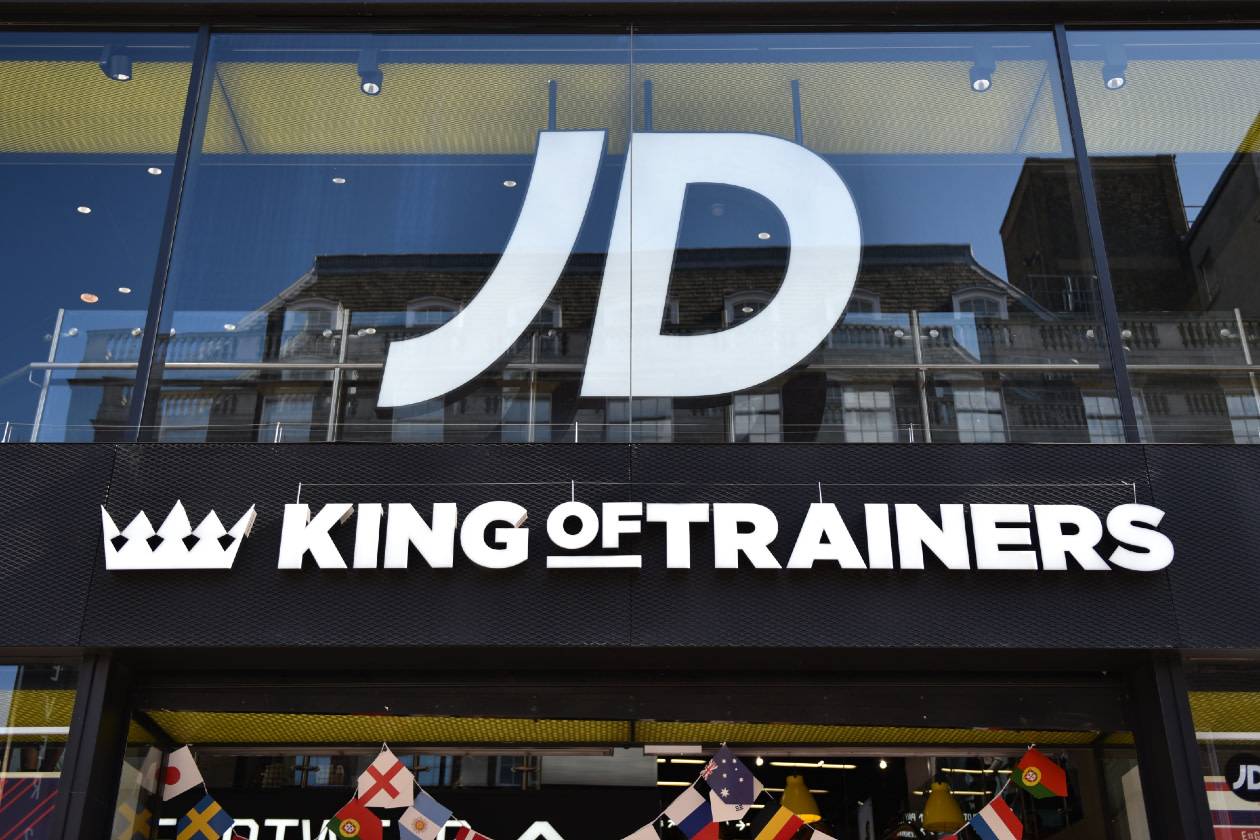JD Sports reported fourth-quarter organic sales growth of 5.6%. All regions were in positive territory, with sales up double-digits in Europe and Asia Pacific.
Full-year profit before tax (PBT) guidance has been reiterated, expected to be in the £915-935mn range.
This year revenue is expected to grow, with recent acquisitions and new floor space expected to contribute around 10% and 4% respectively. PBT is expected land in line with current market expectations of £920mn. Both of these expectations exclude the potential impact changes to tariffs on global trade.
As part of its medium-term update, JD announced it is moving to a period of lower capital investment, which is expected to fall from around 5% to 3-3.5%. With no material merger and acquisition targets in the pipeline, the group expects its funding position to improve.
A £100mn share buyback announcement has been announced.
The shares rose 8.8% in early afternoon trading.
Our view
JD Sports investors breathed a sigh of relief as full-year organic sales growth met market expectations. This comes after a string of recent weak sales and profit downgrades, so just hitting targets was seen as a win, and the shares reacted positively after the announcement.
Last we heard, JD was holding firmer on pricing than competitors, who have leaned into more promotional activity to help clear stock. The company appears to be digging its heels in on this front, not wanting to engage in a fire sale of stock and tarnish its reputation as a more premium store.
While this helps protect margins a little, profits are still getting hurt. In the near term, the trading environment is likely to remain volatile. Management is particularly nervous about the outlook for the UK, seeing potential for higher unemployment and changes to National Insurance and minimum wages set to add around £30mn of additional costs.
Global sports fashion is an attractive and growing market, but JD now expects that rate of growth to be slower than previously expected over the medium term. As a result, the gameplan’s being tweaked, with the group looking to shift its focus from expansion to cash generation.
Recent acquisitions in the US and France have massively expanded the group’s footprint. The focus is now on converting them to the JD brand and leveraging the cost efficiencies this increased scale can bring.
There’s also the elephant in the room – tariffs. The Hibbett acquisition means that the US is now JD Sports’ largest region by sales. Many sports goods are manufactured in countries like Vietnam and China. Given that President Trump’s tariffs heavily target these regions, the cost of goods produced there and brought into the US is expected to rise. The economic outlook is deteriorating, and demand for discretionary items like JD sells is likely to suffer more than other areas of retail.
JD’s guidance for profits to remain broadly flat this year excludes the impact of these recent tariffs, meaning there’s serious scope for guidance to be downgraded as the year progresses. Looking past the near-term uncertainty, we’re pleased with the change of focus from expansion to squeezing the most out of its store footprint. That should strengthen the balance sheet and increase shareholder payouts, although there are no guarantees.
The challenges look priced into the current valuation, which sits well below the long-run average, offering both upside potential and some downside protection. But there’s scope for this year’s profit outlook to worsen as the picture on tariffs can change quickly, and consumer sentiment remains weak.
Environmental, social and governance (ESG) risk
The retail industry is low/medium in terms of ESG risk but varies by subsector. Online retailers are the most exposed, as are companies based in the Asia-Pacific region. The growing demand for transparency and accountability means human rights and environmental risks within supply chains have become a key risk driver. The quality and safety of products as well as their impact on society and the environment are also important considerations.
According to Sustainalytics, JD Sports’ management of ESG risk is strong.
The group’s environmental policy is strong and executive remuneration is explicitly linked to sustainability performance targets. There is also an adequate whistleblower policy in place. However, ESG reporting and disclosures fall short of best practice.
JD Sports key facts
All ratios are sourced from LSEG Datastream, based on previous day’s closing values. Please remember yields are variable and not a reliable indicator of future income. Keep in mind key figures shouldn’t be looked at on their own – it’s important to understand the big picture.
This article is not advice or a recommendation to buy, sell or hold any investment.No view is given on the present or future value or price of any investment, and investors should form their own view on any proposed investment.This article has not been prepared in accordance with legal requirements designed to promote the independence of investment research and is considered a marketing communication.Non - independent research is not subject to FCA rules prohibiting dealing ahead of research, however HL has put controls in place(including dealing restrictions, physical and information barriers) to manage potential conflicts of interest presented by such dealing.Please see our full non - independent research disclosure for more information.


